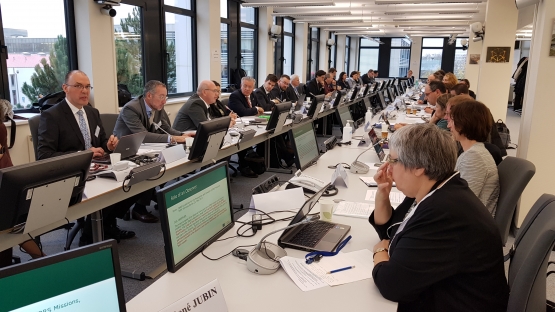Improving the dissemination of good practices identified during peer review services will contribute to the effectiveness of national nuclear and radiation safety infrastructure. This is the main conclusion of a recent meeting between IAEA and Member States’ experts focused on Integrated Regulatory Review Service (IRRS), at the International and Regional Workshops on Lessons Learned from IRRS Missions, held in Luxembourg from 27 to 29 November 2018.
More than 70 participants from 43 countries, including senior experts from regulatory bodies and IAEA staff, discussed how to improve the quality of this major IAEA peer review service. The Agency conducted its 100th mission in September, 12 years after the programme was launched.
IRRS missions assist countries in strengthening the effectiveness of their governmental, legal and regulatory infrastructure, using IAEA safety standards and international good practices as a basis, while recognizing the responsibility of each state to ensure nuclear and radiation safety. Conducted by regulatory experts from around the world, the missions identify opportunities for improvement. They also enable states to learn from each other through policy discussions and the sharing of good practices.
Juan Carlos Lentijo, IAEA Deputy Director General and Head of the Department of Nuclear Safety and Security, emphasized the important role of Member States in ensuring the effectiveness of missions. “Conducting IRRS missions is only possible with strong support from Member States, not only as hosts for missions, but also as suppliers of experts to take part in the review teams,” he said.
The IAEA is well-positioned to encourage Member States at governmental level to raising awareness of the benefits of IRRS and following up, participants agreed. Events such as the IAEA’s General Conference, ministerial meetings and other conferences provide an opportunity for the Agency to highlight recommendations and suggestions made, as well as good practices identified during the missions.
Anna Franzen, Senior International Liaison Officer in the Swedish Radiation Safety Authority and workshop Chairperson, highlighted the importance of conducting the review process efficiently. “Member States have extensive experience, which can be used to identify opportunities to improve the efficiency of the peer review processes,” she said, adding that this can be done by combining missions, for example.
Monitoring of and reporting on missions’ performance is key to continuous improvement, the international workshop conclusions stated. The key performance indicators used after every mission, such as government engagement, objectivity and professionalism of the IRRS team and the quality of the final report, will be used to identify lessons to be learned on the preparation phase, the conduct of the mission and the post mission and follow-up.
“IRRS is the vehicle of choice for European Union Member States for the self-assessment and peer review foreseen under the Nuclear Safety Directive,” said Michael Huebel, Head of the European Commission’s Radiation Protection and Nuclear Safety Unit. “They are committed to the full IRRS process, including follow-up missions, to be repeated over a 10-year cycle.”
The participants concluded that the IRRS review process had improved since the last workshop four years ago. Improvements include a revised and restructured self-assessment tool for the regulatory infrastructure for safety, including regulatory body performance, and the development of a findings database to identify key themes and priorities for further strengthening national regulatory infrastructure. For further improvements, workshop participants called for strengthened dissemination of good practices identified during missions and interaction between the various peer review services offered by the IAEA.





